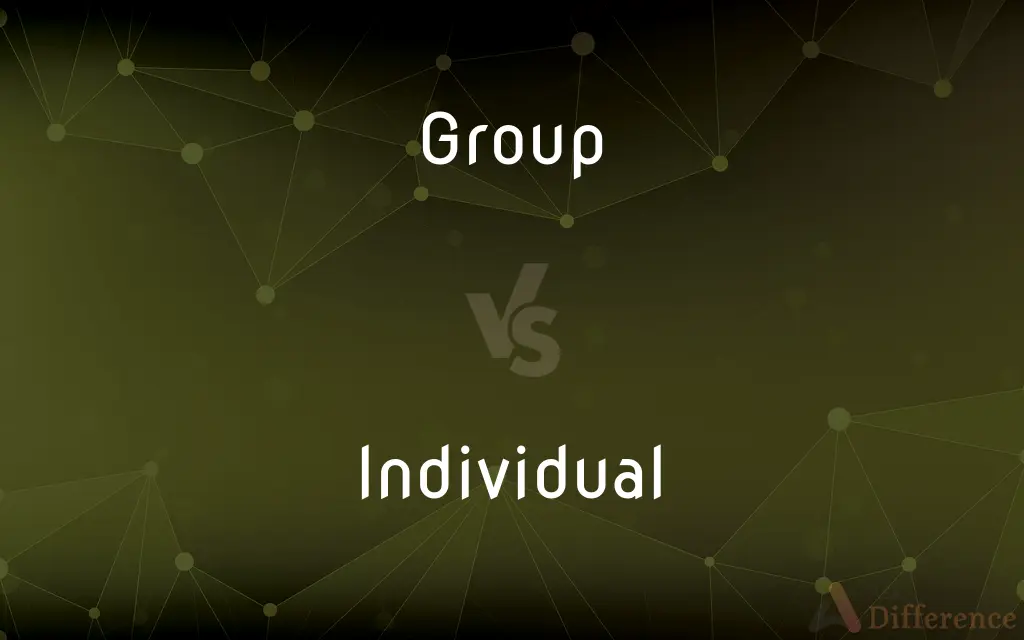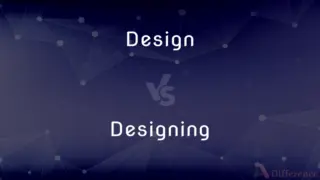Group vs. Individual — What's the Difference?
By Fiza Rafique & Maham Liaqat — Updated on March 31, 2024
A group involves multiple individuals acting together, while an individual refers to a single person, highlighting the contrast between collective and singular entities.

Difference Between Group and Individual
Table of Contents
ADVERTISEMENT
Key Differences
A group is defined as a collection of individuals who come together to achieve a common goal or share a common interest. This collective entity emphasizes collaboration, interaction, and often, a shared identity or purpose. On the other hand, an individual is a single person, distinguished by their unique traits, experiences, and autonomy. The distinction between the two lies in the number of people involved and the dynamics that arise from these interactions.
While groups benefit from diverse perspectives, shared responsibilities, and the potential for greater accomplishments through collective effort, individuals have the advantage of autonomy, quick decision-making, and the ability to express personal identity without compromise. The dynamics within a group can lead to synergies that enhance creativity and problem-solving capabilities; however, they can also result in groupthink or conflicts that may not arise in individual settings.
The concept of identity plays a significant role in differentiating groups from individuals. Within a group, members might adopt a collective identity that aligns with the group’s values and goals, sometimes at the expense of individual identity. Conversely, an individual’s identity is self-determined, reflecting personal values, beliefs, and experiences without the influence of group consensus.
Leadership and decision-making processes vary significantly between groups and individuals. In groups, leadership may be designated or emerge naturally, guiding the group towards its objectives through coordinated efforts. Decision-making can be more complex, requiring consensus or majority rule. In contrast, an individual makes decisions based solely on personal judgment and preferences, providing clarity but lacking the breadth of insight that a group might offer.
Groups and individuals play distinct roles in society and organizations, each with its set of advantages and challenges. Groups can harness the power of collaboration to tackle complex tasks and foster a sense of community and belonging. Individuals, however, offer unique contributions and innovation, driven by their singular vision and capabilities. Understanding the strengths and limitations of both can optimize their effectiveness in achieving personal and collective goals.
ADVERTISEMENT
Comparison Chart
Definition
Multiple individuals acting together.
A single person, distinct and autonomous.
Strengths
Collaboration, diverse perspectives, synergy.
Autonomy, quick decision-making, personal identity.
Challenges
Groupthink, conflict, compromised individuality.
Limited perspectives, solitary effort.
Identity
Collective identity aligned with group goals.
Self-determined, reflecting personal values and experiences.
Decision-making
Requires consensus or majority, can be complex.
Solely based on personal judgment, simpler but less diverse.
Compare with Definitions
Group
A collection of individuals united by common goals or interests.
The study group collaborated on research projects, pooling their knowledge for better outcomes.
Individual
Personal identity is shaped by individual choices, beliefs, and experiences.
His identity as a musician is influenced by a unique blend of genres and personal lyrical themes.
Group
Emphasizes teamwork and shared objectives.
In the sports team, every group member plays a role in achieving victory.
Individual
Makes decisions based on personal preferences and judgment.
She decided to pursue advanced studies in her field of interest, following her individual career path.
Group
Can feature complex dynamics but benefits from diverse input.
The project group elected a leader to coordinate activities and make decisions after group discussions.
Individual
A single person, characterized by unique attributes and autonomy.
The individual artist showcased a collection that reflected personal experiences and creativity.
Group
Involves negotiation of roles, responsibilities, and sometimes conflicts.
The group had to navigate interpersonal dynamics to maintain harmony and progress.
Individual
Direct and straightforward, without the need for external consensus.
As a freelancer, she makes all business decisions herself, from project selection to financial management.
Group
Often adopts a collective identity that may influence individual behavior.
As part of the volunteer group, members felt a shared sense of purpose and responsibility.
Individual
While solitary in decision-making, individuals may seek groups for social fulfillment.
Although he works independently, he joins community groups to connect with like-minded individuals.
Group
An assemblage of persons or objects gathered or located together; an aggregation
A group of dinner guests.
A group of buildings near the road.
Individual
An individual is that which exists as a distinct entity. Individuality (or self-hood) is the state or quality of being an individual; particularly (in the case of humans) of being a person unique from other people and possessing one's own needs or goals, rights and responsibilities.
Group
A set of two or more figures that make up a unit or design, as in sculpture.
Individual
Single; separate
Individual tiny flowers
Group
A number of individuals or things considered or classed together because of similarities
A small group of supporters across the country.
Individual
Of or for a particular person
The individual needs of the children
Group
(Linguistics) A category of related languages that is less inclusive than a family.
Individual
A single human being as distinct from a group
Boat trips for parties and individuals
Group
A military unit consisting of two or more battalions and a headquarters.
Individual
Of or relating to an individual, especially a single human
Individual consciousness.
Group
A unit of two or more squadrons in the US Air Force, smaller than a wing.
Individual
By or for one person
Individual work.
An individual portion.
Group
Two or more atoms behaving or regarded as behaving as a single chemical unit.
Individual
Existing as a distinct entity; separate
Individual drops of rain.
Group
A column in the periodic table of the elements.
Individual
Marked by or expressing individuality; distinctive or individualistic
An individual way of dressing.
Group
(Geology) A stratigraphic unit, especially a unit consisting of two or more formations deposited during a single geologic era.
Individual
Special; particular
Each variety of melon has its individual flavor and texture.
Group
(Mathematics) A set, together with a binary associative operation, such that the set is closed under the operation, the set contains an identity element for the operation, and each element of the set has an inverse element with respect to the operation. The integers form a group under the operation of ordinary addition.
Individual
Serving to identify or set apart
"There was nothing individual about him except a deep scar ... across his right cheek" (Rebecca West).
Group
Of, relating to, constituting, or being a member of a group
A group discussion.
A group effort.
Individual
A single human considered apart from a society or community
The rights of the individual.
Group
To place or arrange in a group
Grouped the children according to height.
Individual
A human regarded as a distinctive or unique personality
Always treated her clients as individuals.
Felt he was quite an individual.
Group
To belong to or form a group
The soldiers began to group on the hillside.
Individual
A single organism as distinguished from a species, community, or group.
Group
A number of things or persons being in some relation to one another.
There is a group of houses behind the hill;
He left town to join a Communist group
A group of people gathered in front of the Parliament to demonstrate against the Prime Minister's proposals.
Individual
A member of a collection or set; a specimen.
Group
(group theory) A set with an associative binary operation, under which there exists an identity element, and such that each element has an inverse.
Individual
A person considered alone, rather than as belonging to a group of people.
He is an unusual individual.
Group
An effective divisor on a curve.
Individual
(legal) A single physical human being as a legal subject, as opposed to a legal person such as a corporation.
Group
A (usually small) group of people who perform music together.
Did you see the new jazz group?
Individual
An object, be it a thing or an agent, as contrasted to a class.
Group
(astronomy) A small number (up to about fifty) of galaxies that are near each other.
Individual
(statistics) An element belonging to a population.
Group
(chemistry) A column in the periodic table of chemical elements.
Individual
Relating to a single person or thing as opposed to more than one.
As we can't print them all together, the individual pages will have to be printed one by one.
Group
(chemistry) A functional group.
Nitro is an electron-withdrawing group.
Individual
Intended for a single person as opposed to more than one person.
Individual personal pension; individual cream cakes
Group
(sociology) A subset of a culture or of a society.
Individual
Not divisible without losing its identity.
Group
(military) An air force formation.
Individual
Not divided, or not to be divided; existing as one entity, or distinct being or object; single; one; as, an individual man, animal, or city.
Mind has a being of its own, distinct from that of all other things, and is pure, unmingled, individual substance.
United as one individual soul.
Group
(geology) A collection of formations or rock strata.
Individual
Of or pertaining to one only; peculiar to, or characteristic of, a single person or thing; distinctive; as, individual traits of character; individual exertions; individual peculiarities.
Group
(computing) A number of users with the same rights with respect to accession, modification, and execution of files, computers and peripherals.
Individual
A single person, animal, or thing of any kind; a thing or being incapable of separation or division, without losing its identity; especially, a human being; a person.
An object which is in the strict and primary sense one, and can not be logically divided, is called an individual.
That individuals die, his will ordains.
Group
An element of an espresso machine from which hot water pours into the portafilter.
Individual
An independent, or partially independent, zooid of a compound animal.
Group
(music) A number of eighth, sixteenth, etc., notes joined at the stems; sometimes rather indefinitely applied to any ornament made up of a few short notes.
Individual
A human being;
There was too much for one person to do
Group
(sports) A set of teams playing each other in the same division, while not during the same period playing any teams that belong to other sets in the division.
Individual
A single organism
Group
(business) A commercial organization.
Individual
Being or characteristic of a single thing or person;
Individual drops of rain
Please mark the individual pages
They went their individual ways
Group
(transitive) To put together to form a group.
Group the dogs by hair colour
Individual
Separate and distinct from others of the same kind;
Mark the individual pages
On a case-by-case basis
Group
(intransitive) To come together to form a group.
Individual
Characteristic of or meant for a single person or thing;
An individual serving
Separate rooms
Single occupancy
A single bed
Group
A cluster, crowd, or throng; an assemblage, either of persons or things, collected without any regular form or arrangement; as, a group of men or of trees; a group of isles.
Individual
Concerning one person exclusively;
We all have individual cars
Each room has a private bath
Group
An assemblage of objects in a certain order or relation, or having some resemblance or common characteristic; as, groups of strata.
Group
A variously limited assemblage of animals or plants, having some resemblance, or common characteristics in form or structure. The term has different uses, and may be made to include certain species of a genus, or a whole genus, or certain genera, or even several orders.
Group
A number of eighth, sixteenth, etc., notes joined at the stems; - sometimes rather indefinitely applied to any ornament made up of a few short notes.
Group
To form a group of; to arrange or combine in a group or in groups, often with reference to mutual relation and the best effect; to form an assemblage of.
The difficulty lies in drawing and disposing, or, as the painters term it, in grouping such a multitude of different objects.
Group
Any number of entities (members) considered as a unit
Group
(chemistry) two or more atoms bound together as a single unit and forming part of a molecule
Group
A set that is closed, associative, has an identity element and every element has an inverse
Group
Arrange into a group or groups;
Can you group these shapes together?
Group
Form a group or group together
Common Curiosities
What defines a group?
A group is defined by multiple individuals coming together with a common purpose or interest, emphasizing collective action and identity.
How does an individual differ from a group?
An individual is a single, autonomous person with unique traits and abilities, differing from a group which consists of multiple individuals acting collectively.
How do groups and individuals contribute to society?
Both play crucial roles: groups foster collaboration and community, tackling complex issues, while individuals drive innovation and personal expression.
Can groups experience conflict?
Yes, groups can experience conflict due to differing opinions, personalities, or interests, requiring effective communication and negotiation to resolve.
How does autonomy affect group dynamics?
Individual autonomy within a group can contribute to diversity of thought and innovation but may require balance with group cohesion and objectives.
What are the challenges of working in a group?
Challenges include managing group dynamics, potential for conflict, and sometimes sacrificing individuality for collective goals.
Is leadership necessary in a group?
Leadership can guide a group towards its objectives more effectively, organizing efforts and making pivotal decisions, though its form can vary.
Can an individual be part of multiple groups?
Yes, individuals often belong to multiple groups, each with different purposes or interests, enriching their social and professional lives.
Can an individual have the same impact as a group?
An individual can have a significant impact through unique contributions and innovation, although a group might achieve broader or more complex objectives through collective effort.
How does personal identity fit within a group?
Within a group, personal identity can blend with collective identity, though individuals might strive to maintain their uniqueness amidst group influences.
How do individuals make decisions differently from groups?
Individuals make decisions based on personal judgment and preferences, while group decisions require negotiation, consensus, or majority rule.
What are the advantages of individual decision-making?
Advantages include clarity, speed, and alignment with personal values, without the need for consensus or compromise.
How do groups form an identity?
Groups form a collective identity through shared goals, values, and experiences, which can influence individual members’ behaviors and perceptions.
What role does communication play in group effectiveness?
Effective communication is crucial for aligning goals, resolving conflicts, and facilitating collaboration within a group, enhancing its overall success.
What motivates individuals to join groups?
Motivations include social belonging, achieving common goals, sharing interests, and the desire for collaboration and support.
Share Your Discovery

Previous Comparison
Design vs. Designing
Next Comparison
Leaf vs. LeaveAuthor Spotlight
Written by
Fiza RafiqueFiza Rafique is a skilled content writer at AskDifference.com, where she meticulously refines and enhances written pieces. Drawing from her vast editorial expertise, Fiza ensures clarity, accuracy, and precision in every article. Passionate about language, she continually seeks to elevate the quality of content for readers worldwide.
Co-written by
Maham Liaqat













































